

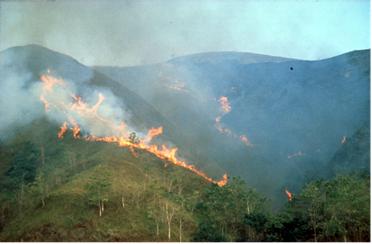
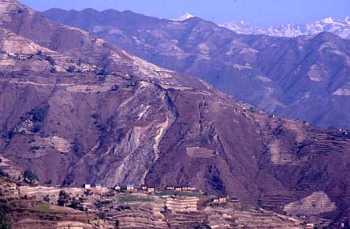
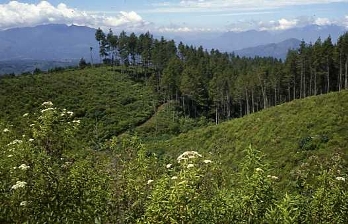
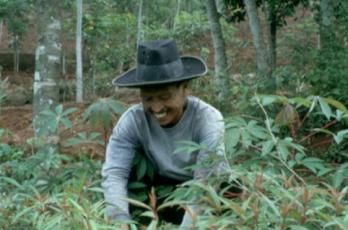
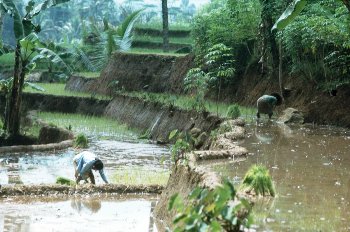
Contact: l.a.bruijnzeel@vu.nl or j.groen@vu.nl
Estimates of the extent of global land degradation vary between 15% and 23% of the total land surface area[1,2].
Of the various forms of soil degrading processes, soil erosion by water is predominant (55%), followed by wind erosion (28%).
The lives of an estimated 1.5 billion people are affected directly by land degradation[1,2] and governments spend billions annually to address the adverse consequences of erosion[3].
Various global initiatives have recently advocated the need for large-scale forest and landscape restoration, such as the Global Partnership in Forest Landscape Restoration, the Bonn Challenge, and, most recently, the Ecosystem Return Foundation initiative.
In support of these and similar initiatives, ACRES_R3 aims to provide a platform for the generation and exchange of knowledge on the linkages between soil, plant, water and atmosphere across the full land/ecosystem degradation and restoration spectrum found under tropical, sub-tropical, and Mediterranean climatic conditions (i.e. the regions most strongly affected by land/ecosystem degradation [1,2]).
In addition, ACRES_R3 aims to generate and exchange knowledge with regard to the most appropriate incentives for ecosystem restoration as well as the design of effective policy tools and governance mechanisms for facilitating cooperation in landscape-scale restoration and natural resource management.
Unambiguous assessment of the degree of land degradation (and by implication of the need for land/ecosystem restoration) is still a matter of debate.
Furthermore, there is a distinct lack of quantitative information on the hydrological functioning of severely degraded areas at the catchment scale, both under humid and dry tropical conditions.
Even less is known about the changes in vegetation functioning and its feedbacks on groundwater recharge, rainfall, and soil fertility build-up associated with large-scale ecosystem restoration or the reforestation/regreening of severely degraded land, particularly under drier conditions.
Understanding how land and people will respond to various forms of restoration and how this varies geographically from region to region is critical to effective investment and land use governance, and ultimately for the success of restoration programmes, both locally and downstream.
In this regard, special attention needs to be paid to the distribution of the costs and benefits of restoration and to the public good externalities (e.g. water yield) associated with ecosystem restoration, which create ‘free riding’ incentives that cause local people to under-invest in the restoration.
Controlling 'free rider' behaviour, creating incentives for the sustainable management of soil and water resources, designing contracts to facilitate investments in healthy ecosystems, and coordinating efforts at the landscape level are all necessary elements to ensure effective restoration of degraded lands and ecosystems at the landscape scale.
Read more on key research gaps.
ACRES_R3 is an informal joint initiative of researchers from the VU University Amsterdam (VUA) and the University of Amsterdam (UvA) to bring together their considerable research expertise in the field of: land degradation assessment (both on the ground and through remote sensing); soil organic matter dynamics; ecosystem biomass, productivity, nutrient dynamics and balances (biogeochemistry); feedbacks between plant functional traits and soil processes; hillslope hydrological functioning (streamflow generation, rainwater harvesting); soil erosion and sedimentation; ecohydrology of tropical and Mediterranean vegetation types; land-use hydrology; groundwater recharge (hydrogeology); fire ecology; sustainable land management and innovative farming methods; agrobiodiversity and agroforestry; environmental economics, behavioural incentives and community-based approaches to sustainable resource use; and spatially distributed monitoring and modelling.
ACRES_R3 participants include senior and mid-career scientists working in the above fields at the VUA and UvA as well as a support group of affiliated internationally recognised experts in (inter alia) tropical forestry and forest restoration, plant physiology (plant water use), ecohydrology of dry-lands and cloud-affected ecosystems, hillslope hydrology and sediment transport; and spatial modelling (see below).
The group is expected to grow organically as field projects in different regions will be developed.
Collaborators (founding members in bold font, *member of ACRES_R3 Steering Group):
International support group (under development):
Below a summary is given of research themes and projects relevant to ACRES_R3 as carried out by the various contributing groups within the VUA and UvA.
Research of relevance to ACRES_R3 focuses largely on the soil and water impacts of reforestation, with past projects in Java, Fiji, Slovenia, and Brazil, and current work conducted in collaboration with national and international partners on the hydrological consequences of reforesting degraded lands in Nepal, the Philippines, Mexico, and Colombia.
Water and soil are amongst our most precious environmental resources. Both are highly vulnerable to environmental and human-induced changes, and solutions to promote their sustainable use are thus of paramount importance. Knowledge of the manifold interactions between soil, water, vegetation and atmosphere are key to understanding the response to changes of the complex geo-ecosystems we live in. One of the key research lines of the EES group focuses on Degrading Dryland Ecosystems for which various 'green' degradation mitigation strategies are being explored; others focus on the role of carbon in degrading systems with regard to soil quality change, erosion, transport and (temporary) carbon storage within the landscape. The research projects are conducted and supervised by Dr. L.H. Cammeraat. Read more on EES.
The Systems Ecology Group is involved in several projects in China, Indonesia, and Costa Rica. Read more here.
Over the past 25 years, the VU University's Centre for International Cooperation (CIS-VU) has been active worldwide in promoting sustainable land management, with a focus on Sub-Saharan Africa. We have been involved in the design (e.g. the Lake Tana Watershed programme for IFAD-GEF in Ethiopia), the implementation (e.g. Stimulating Community Initiatives in Sustainable Land Management, SCI-SLM) and the evaluation of projects (e.g. the Pan-African Desert Margin Programme for UNEP-GEF). High on our list of priorities has been highlighting 'success stories' of sustainable land management in the face of severe land degradation, with documentation in both written and video form (e.g. "More People, More Trees: Environmental Recovery in Africa"). CIS-VU has long held a close relationship with the World Overview of Conservation Approaches and Technologies (WOCAT). Previous and current work has been supervised and coordinated by Dr. William Critchley, Chris Reij MSc, Dr. Denyse Snelder and Sabina Di Prima MSc. Some recent projects are listed here. For further information on the work and products of CIS-VU, click here.
The Institute for Environmental Studies (IVM) is an interdisciplinary research institute at VU University Amsterdam that sits within the Faculty of Earth and Life Sciences (FALW). Since its creation in 1971, IVM built up considerable experience in dealing with the complexities of environmental problems. Our multidisciplinary research is organised in four departments: Chemistry and Biology, Environmental Economics, Environmental Policy and Governance and Spatial Analysis and Decision Support. IVM's mission is to contribute to sustainable development and care for the environment through scientific research and teaching. A unique feature of the institute is the capacity to conduct environmental studies in their societal and economic context by integrating natural and social science perspectives. Read more on individual projects here
1. Oldeman, R.A.A. et al. (1991). World map of the status of human-induced soil degradation. 2nd Edition, ISRIC, Wageningen.
2. Bai, Z.G. et al. (2008). Proxy global assessment of land degradation. Soil Use and Management 24: 223-234.
3. Pimentel, D. et al. (1995). Environmental and economic costs of soil erosion and conservation benefits. Science 267: 1117-1123.